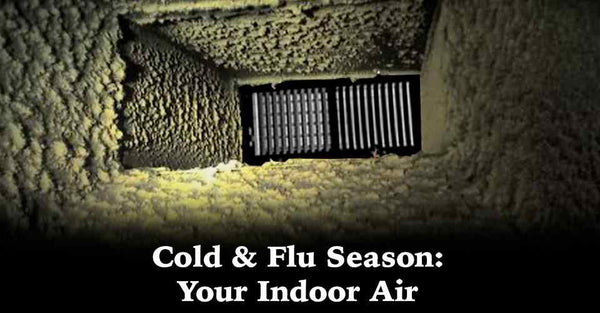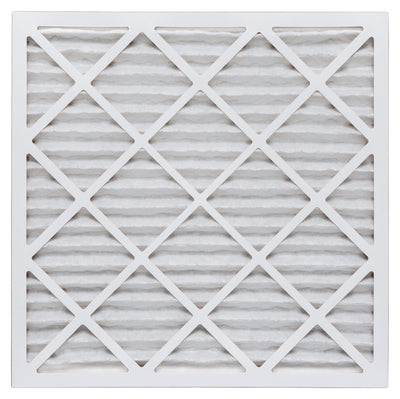Cold and Flu Season: How to Improve Indoor Air Quality
How Does Indoor Air Quality Affect Our Health?
Cold and Flu season is upon us. The air gets chilled and we tend to spend more time indoors. The Center for Disease Control(CDC) reports that there are millions of cases of the common cold each year, with children being affected the most. While you can suffer from a cold year-round, fall and winter are known as "cold and flu season." For some parts of the country, furnaces and heaters are constantly in use, and if you have neglected to take care of your system through the year, you may be overdue for service. The first defense in preventing cold and flu during this season is improving your indoor air quality because where you spend most of the day influences how often you get sick, whether at work or at home.

Common Indoor Air Pollutants
- Viruses - More than 100 different types of viruses can cause you to have the common cold, but only influenza-type viruses A, B, and C cause the flu. Although they are seasonal, Type A viruses mutate every year and transform into new strains, which is why you need to have a flu shot every year.
- Bacteria - Virtually everywhere, bacteria can be a major cause of respiratory conditions. It can cause allergies, asthma, and even infections. Symptoms often include inflammation in the nose, throat, sinuses, and lungs.
- Mold Spores - Mold is a fungus that can cause major damage to your property and serious health issues. Long exposure to mold spores can cause serious respiratory conditions such as chronic sinusitis, allergies, or asthma. Also, at the right temperature and humidity, mold can feast on your house’s carpet, drywall, wood, and any other material.
- Dust Mites - These microscopic insects can cause major allergic reactions. They live off dead skin cells and hair that accumulate on furniture, mattresses, pillows, and others. Dust mites reproduce quickly, and you can have millions or billions trapped inside your house.
- "Harmless" Chemicals - Common household chemicals like chlorine and ammonia can create toxic gasses when they are combined. They can linger in the air for hours, and you can be overwhelmed with the fumes. If this happens in your home, evacuate and open all windows and doors to allow the fumes to dissipate.
- Cigar and Cigarette Smoke - Smoking inside is another major influence on your home's air quality. Whether it’s a cigar or cigarettes, secondhand smoke is just as harmful as smoking. Smoke is often a common trigger for allergy and asthma sufferers. The lingering smells remain in the home for an extended time, attaching to curtains, carpets, walls, and bedding.
- Pet Dander - Dogs and cats shed, which gets hair everywhere. Much of this hair is swept up into the ductwork, where the furnace filter catches it, so it can't re-circulate back into your home. Pet owners know that excess pet fur, feathers, bodily fluids, and dander can stifle the air in your home. This is especially the case for those who have allergies or asthma. For these individuals, indoor air quality should be a top priority.
- Scented Candles and Sprays - Even pleasantly scented candles and air fresheners can contribute to indoor air pollution because these products obtain their scents from chemicals. Candles that are made from paraffin wax contain toxins such as benzene, which causes your air to be loaded with heavy metals.
- Outdoor Air - When the outdoor air suffers, your indoor air will also suffer. If you live in a polluted city or in pollen-heavy, wooded areas, your indoor air may be more polluted than you think. Homes in wildfire-prone areas are also likely to feel the effects of poor outdoor air quality.
These pollutants hide in your ducts, float through your air, and lay on the tables, countertops, and other surfaces in your house. It sounds disgusting, right? Let's look at how to improve your indoor air quality.
Ways to Improve Indoor Air Quality
- Change Your Air Filters - If you're wondering can a dirty air filter make you sick, the simple answer is yes. Air filters trap pollutants, allergens, and contaminants, and they can get gross once they're full. If you forget to change them, you're inviting trouble into your home. A fresh air filter, especially one with a MERV 11 or 13 rating, can capture bacteria and many viruses before they spread through your indoor air and cause infection. It can also filter out allergens like smoke, pollen, dust mites, and pet dander. One of the simplest most effective things you can do is to change your furnace or air conditioning filter regularly and schedule a yearly check-up.
- Use an Air Scrubber - Using an air scrubber is an excellent way to get rid of contaminants in the air. Keep in mind that it's meant for small spaces, not the entire household. Most users place theirs in their bedrooms and living rooms for optimal use and efficiency.
- Open Your Windows - By opening your windows periodically, you let fresh air flow in and out of your home. This can be done before you turn on your furnace or AC.
- Properly Ventilate - If you absolutely must use chemicals in your household, ensure the space you're in is properly ventilated by opening windows and turning on exhaust fans until the fumes dissipate. Truly the most effective way to avoid potentially hazardous chemicals is to switch your cleaning agents to more natural options. White vinegar, baking soda, and lemon juice are all excellent cleaning agents – and all-natural.
- Add Live Plants - Adding live plants to your home is a good idea when it comes to enhancing the quality of air in your space. There have been several studies over the years, including one from NASA about the benefits of air-purifying plants suggesting that those plants and their soil and root systems can trap some harmful indoor air pollutants. Spider plants, for instance, are non-toxic to common household pets and humans and are quite easy to grow. Scroll down for a more extensive list of plants for indoor air quality.
Defending your home against cold and flu viruses starts with making sure your indoor air is as clean and free of contaminants as possible. Of course, practicing good hygiene should be automatic – wash your hands for at least 20 seconds with warm, soapy water, avoid people you know are sick and try to keep anyone who is ill in your home confined to one space as much as possible to keep the illness from spreading. When you must be in contact with a sick person, a face mask will help limit the spread through the air.
Indoor Plants That Improve Air Quality
As mentioned above, certain plants can influence the condition of the air in your home. If you are looking to use this method to improve your indoor air quality, you might want to consider the following plants:
- Spider plants
- Chinese evergreen
- Peace lily
- Bamboo palm
- Boston fern
- Dragon tree
- Daisies
- Snake Plant
Note: If you have pets at home, make sure any plant you want to keep indoors isn't toxic or is out of reach to your furry friends.
Are you ready to change your air filter but not sure what size you need? Check out our Helpful Tip for measuring your air filter to make sure you get exactly what you need.




